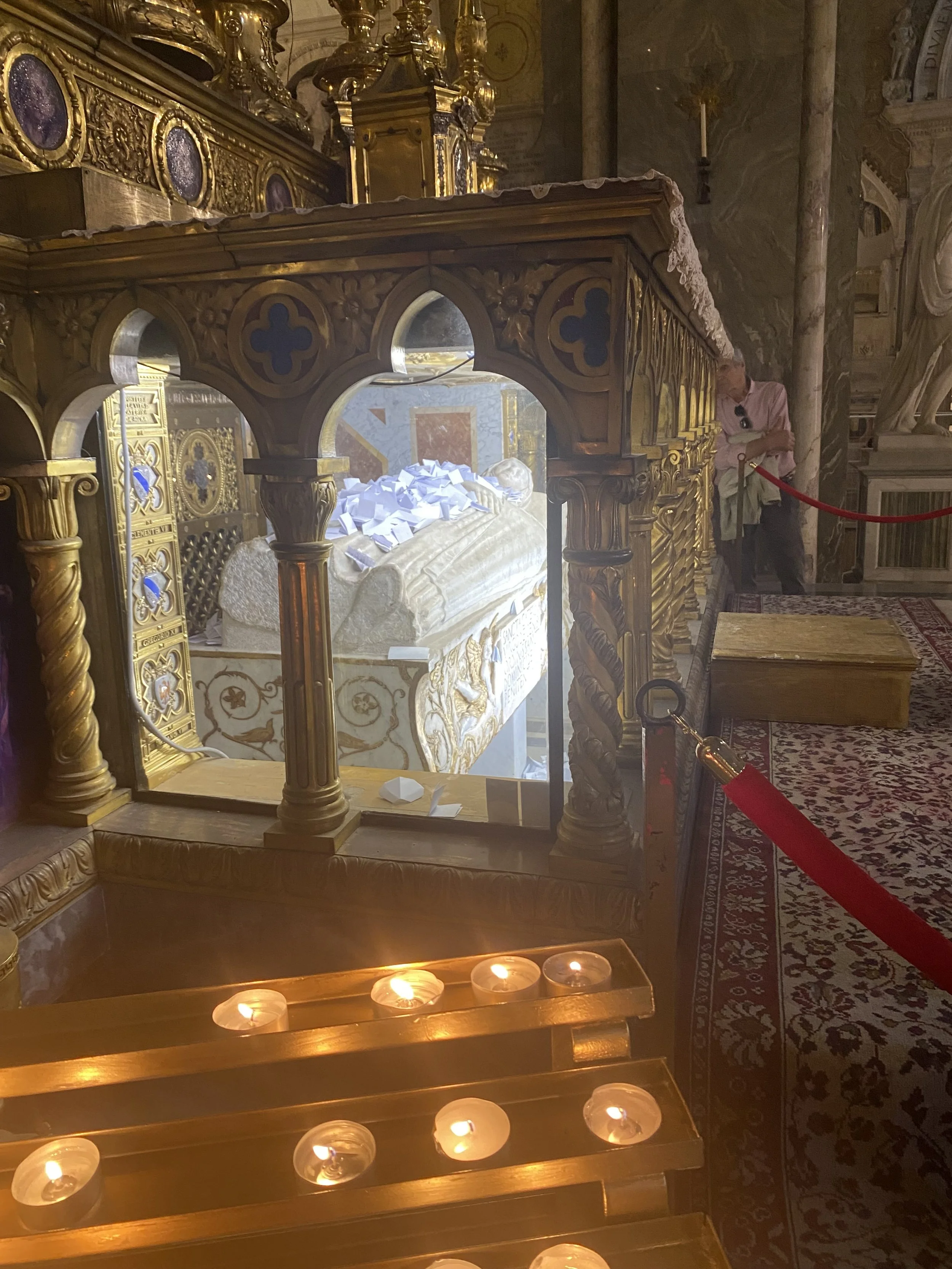A Survivor Visits Rome
Natalie Pucillo in Rome, near St. Peter’s Basilica
Last month, I was equally thrilled and apprehensive to travel to Rome to meet with delegates of the Synod on Synodality, Vatican leaders, and other ministry partners. I am studying for my Master of Divinity at Loyola University Chicago and was honored to take this week-long trip through the Catholic Education Network to Engage Rome and Synodality (CENTERS) initiative, which gathered 150 students from 15 universities to visit Rome during the synod. As a survivor of sexual abuse in the Catholic Church, I was not sure what this journey would feel like, but I hoped to experience the goodness of faith without the burden of institutional shortcomings. As the week unfolded, I found that while my experience was complex, I left with renewed hope in the potential of solidarity and healing.
Within this synodal approach, we are encouraged to listen to the Holy Spirit, seek the Spirit’s presence in each other’s stories, and then act together to create a better future. Because of my own story as a survivor of abuse by a lay minister, my perspective of synodality has been fundamentally formed by my experiences of reporting and healing. I have suffered from hierarchical efforts to defend abusers; I have also benefitted from systems that prioritize survivor voices. If we are to become a truly synodal Church, we must confront these painful realities within the institution and invite the Holy Spirit to guide us in wisdom and justice. In a particular way, we must listen to the witness of survivors and commit to transparency and accountability as we break the culture of silence that has allowed Church leaders to abuse in the first place.
A Heavy Burden
In one glaring example of harmful silence from the week, our cohort visited the Jesuit Curia. Tour guides led us around the building, and one of our stops was a chapel decorated by Marko Rupnik, a former Jesuit who is credibly reported to have abused women in connection with his artistic process. Seeing his mosaics in this sacred setting induced a deep, painful trauma response in me. Because I was abused by a composer of sacred music, I am all too familiar with the dismissive “art over artist” argument, and it was heartbreaking to have this reminder that Church leaders continue to prioritize aesthetics over accountability. I was further disturbed that our Jesuit tour guides never acknowledged Rupnik’s abuse, leaving me to educate our cohort. This was, in many ways, what I had dreaded about this experience: affirmation that Church leaders still actively choose to disregard survivors’ perspectives and requests for accountability.
Part of me wanted to hide my perspective as a survivor during the week. It can be a heavy burden to be the reminder that abuse is a current reality, and I have more to offer this Church than my trauma. Yet even when I was the only person who spoke up, my voice was met with empathy and solidarity. Sometimes the response was sorrow for my pain; sometimes, a desire to learn how to support survivors better; once or twice, a disclosure in return. These responses gave me hope for a Church that can find healing and transformation through deep listening.
Intense Healing
While in Rome, Natalie also visited the tomb of St. Catherine of Siena, one of Awake’s patron saints.
And moments of intense healing did shine through; perhaps this was God letting me know that my efforts were not in vain! One of the most powerful experiences I had that week was attending Mass in the Crypt of the Basilica of St. Peter. During that Mass, I led our community in praying an intercession for all who have been wounded by abuse in the Church. A part of me hopes that somewhere upstairs, Pope Francis felt the strength with which I invited us to pray for survivors! Throughout the week, I had a tangible sense of the universality of the Catholic faith, which stretches not just across continents, but through time. This felt positive in some moments, and negative in others. But in that chapel, so close to the tomb of the first pope and an important intercessor in my life, I was able to reclaim a piece of my faith as the strength of the saints sustained me in prayer. They, too, lament what survivors have lost through abuse. God laments with us.
That week was just as complicated as every other moment that I remain Catholic. But my time in Rome did strengthen my hope that the Church might use this synodal approach to work for healing and transformation from the crisis of abuse. Some days, remaining in the Church is nothing short of agony, especially when its institutional decisions fail survivors. Yet I found encouragement in the other CENTERS participants, and the ways that they allow God’s voice to inspire their actions. Healing starts when survivors are heard, seen, and believed, and I have hope that the effects of this Synod on Synodality will help us all respond to survivors with a better eye toward compassion and justice.
—Natalie Pucillo, Awake Leadership Team


